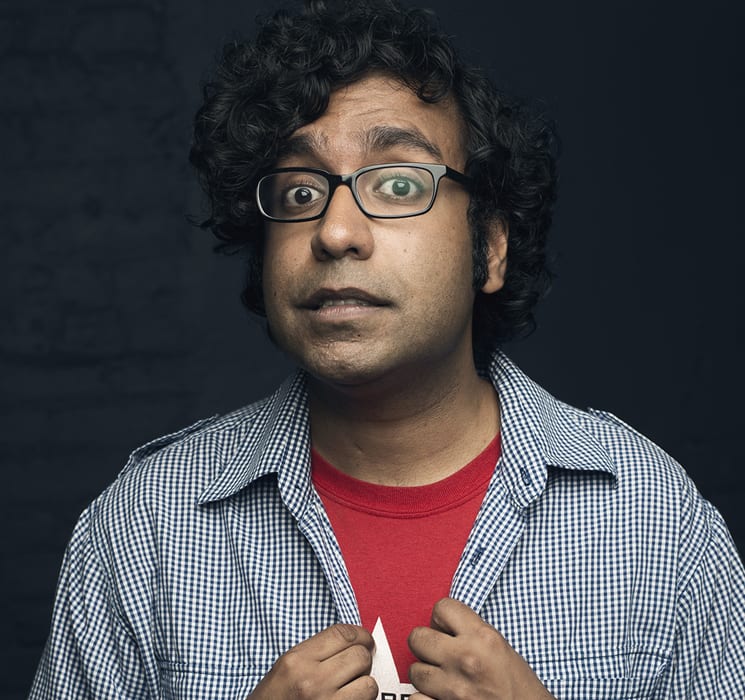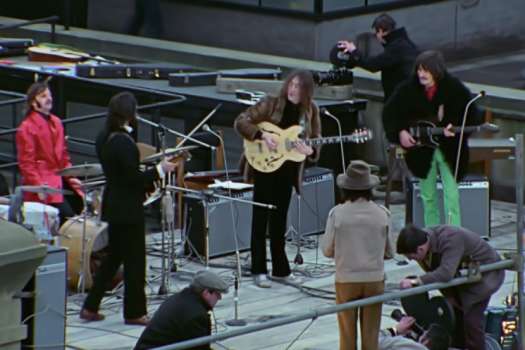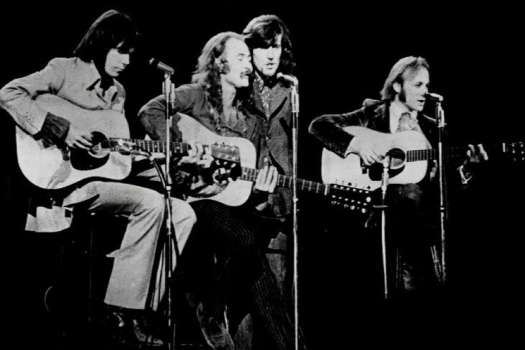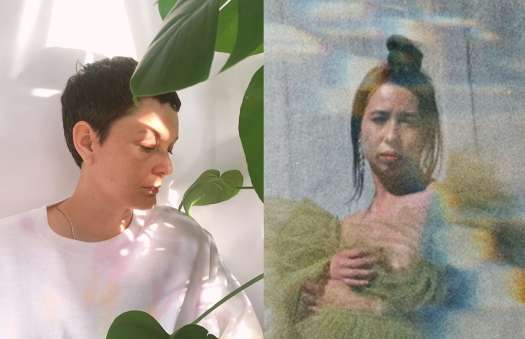When he surveys the political landscape in 2016, Brooklyn-based comedian Hari Kondabolu questions time itself.
"I've seen films about authoritarian futures and I've also seen films about prehistoric times, and I can imagine both of those possibilities for this country," he tells Exclaim! over Skype. "It is devastating. It's very scary to think about the future, but more than that, I think it's scarier to think about what the present actually is."
A very funny and incisive standup comedian and writer, Kondobolu cohosts the Politically Re-Active podcast with W. Kamau Bell. In 2014, Kill Rock Stars released his highly acclaimed and hilarious standup album, Waiting for 2042 and, earlier this year, he followed that up with his excellent, uncompromising Mainstream American Comic, which is a wonderful mix of absurd observational stories and socio-political commentary.
His current tour brings him to Toronto's Queen Elizabeth Theatre on November 4 and Vancouver's Rio Theatre on December 3. He will undoubtedly discuss the horror show that the U.S. presidential race has been. He says he had no idea Trump would earn so much support from people, as he viewed him as a joke or Mickey Mouse candidate who couldn't possibly compete for this job.
"And all of sudden, Mickey Mouse could win," he says, the shock registering in his voice. "Except that Mickey Mouse is harmless. This guy's a fucking maniac.
"It's funny that the media can't straight-up say that Donald Trump is a maniac, because apparently that sounds biased. But to me, objectively, he does seem like a maniac. He does things that maniacs do. His show The Apprentice was a hit because he treated people like shit on television to huge ratings for money. Saying 'You're fired' in front of millions of people is a shitty thing to do, and he was rewarded with a show and money. And now, we're rewarding him again for being an asshole to us. That's weird.
"He's essentially the 'Million Dollar Man' Ted DiBiase," Kondabolu concludes. "He is a 1980s caricature of an eccentric rich person."
Speaking of the '80s, Kondabolu has been pondering his upbringing more in his act, mostly by talking a lot about his mom and the things she says and does.
"She's funny, she's thoughtful, she's so many complicated things and such a big part of my life. She's one of my best friends and has shaped me and my brother's comedy too; we're funny because of her," he says, referring to his younger sibling Ashok, aka Dap, from the now defunct hip-hop crew, Das Racist.
"For years I resisted talking about my immigrant parents because I worried how that would be viewed," Kondabolu continues. "'Oh, it's so hack-y and it's been done before.' I finally got over that because everybody has parents. That's a universal and they shape you and it's about how you talk about them.
"So, to me they're not wacky immigrants with accents who don't know anything. I talk about them as full people. I talk about my mom's personality. To make a person a person, you have to talk about their brains and their wits. So that was huge for me: Let me represent my parents, who are immigrants, in a way that's more realistic, more honest to their experience, and shapes things a little bit.
"It's a shame that it's revolutionary in any way to show that immigrants are people with a wide range of thoughts, feelings and emotions."
Kondabolu is part of a small cohort of brown people who now occupy more prominent roles in pop culture. Comedians like Aziz Ansari, Mindy Kaling, Russell Peters and Aparna Nancherla have broken through in a noticeable way. Or at least it's noticeable to a brown person like me who rarely sees people who look like me in "diverse" ensemble casts for shows like, say, Saturday Night Live.
"There's never been an Asian person on Saturday Night Live," Kondabolu explains. "That's a show that benefits from flexibility and it'd be better for them financially, because they'd save money on face paint."
Nevertheless, some progress in the ascendancy of brown artists is notable in a post-9/11, terrorism-shocked, Trump-at-50-percent-in-the-polls hellscape that we currently occupy. Kondabolu has his own take on this bit of cognitive dissonance.
"It's not one, simple, linear answer. The more representations you get, the more holistic a view of a people you get. In one era, it was just Apu [from The Simpsons] who was an immigrant caricature — I would argue a very racially inaccurate and upsetting character voiced by a white guy. On the other end of it, there's 'Brown people will kill you.' Those are the two parts but, as you and I know, there's a lot in between those two parts.
"So, when you see an Indian person and you don't normally see a lot of Indian people, you go through a mental rolodex of visual cues to determine, 'What kind of person is this?' which — it sucks that that's how human minds work, but it seems to be the way they work. But if you have a larger rolodex of visual cues, all of a sudden you can be more open to the fact that this might be somebody you can be friends with, or can relate to, or can have a conversation with. That makes them human and it's harder to justify broad racial profiling and racism.
"That might be happening right now but that doesn't mean it's happening where people are changed in a linear way. Young people are likely being transformed slowly by this, but there are still some people who have very strong feelings about what's destroying the country and don't like brown people broadly, because of immigrants changing the culture, or based on depictions of Muslims.
"Those images are so strong and embedded in some people that Aziz Ansari, being a dark-skinned Muslim, Indian, American comedian from North Carolina — that alone is not going to do the trick to shake the narrative for them.
"It's going to take a lot longer. It's like short-term fear, long-term change."
See Hari Kondabolu live across Canada and the U.S.A. in the coming weeks.
Listen to this entire interview via the Kreative Kontrol podcast:
"I've seen films about authoritarian futures and I've also seen films about prehistoric times, and I can imagine both of those possibilities for this country," he tells Exclaim! over Skype. "It is devastating. It's very scary to think about the future, but more than that, I think it's scarier to think about what the present actually is."
A very funny and incisive standup comedian and writer, Kondobolu cohosts the Politically Re-Active podcast with W. Kamau Bell. In 2014, Kill Rock Stars released his highly acclaimed and hilarious standup album, Waiting for 2042 and, earlier this year, he followed that up with his excellent, uncompromising Mainstream American Comic, which is a wonderful mix of absurd observational stories and socio-political commentary.
His current tour brings him to Toronto's Queen Elizabeth Theatre on November 4 and Vancouver's Rio Theatre on December 3. He will undoubtedly discuss the horror show that the U.S. presidential race has been. He says he had no idea Trump would earn so much support from people, as he viewed him as a joke or Mickey Mouse candidate who couldn't possibly compete for this job.
"And all of sudden, Mickey Mouse could win," he says, the shock registering in his voice. "Except that Mickey Mouse is harmless. This guy's a fucking maniac.
"It's funny that the media can't straight-up say that Donald Trump is a maniac, because apparently that sounds biased. But to me, objectively, he does seem like a maniac. He does things that maniacs do. His show The Apprentice was a hit because he treated people like shit on television to huge ratings for money. Saying 'You're fired' in front of millions of people is a shitty thing to do, and he was rewarded with a show and money. And now, we're rewarding him again for being an asshole to us. That's weird.
"He's essentially the 'Million Dollar Man' Ted DiBiase," Kondabolu concludes. "He is a 1980s caricature of an eccentric rich person."
Speaking of the '80s, Kondabolu has been pondering his upbringing more in his act, mostly by talking a lot about his mom and the things she says and does.
"She's funny, she's thoughtful, she's so many complicated things and such a big part of my life. She's one of my best friends and has shaped me and my brother's comedy too; we're funny because of her," he says, referring to his younger sibling Ashok, aka Dap, from the now defunct hip-hop crew, Das Racist.
"For years I resisted talking about my immigrant parents because I worried how that would be viewed," Kondabolu continues. "'Oh, it's so hack-y and it's been done before.' I finally got over that because everybody has parents. That's a universal and they shape you and it's about how you talk about them.
"So, to me they're not wacky immigrants with accents who don't know anything. I talk about them as full people. I talk about my mom's personality. To make a person a person, you have to talk about their brains and their wits. So that was huge for me: Let me represent my parents, who are immigrants, in a way that's more realistic, more honest to their experience, and shapes things a little bit.
"It's a shame that it's revolutionary in any way to show that immigrants are people with a wide range of thoughts, feelings and emotions."
Kondabolu is part of a small cohort of brown people who now occupy more prominent roles in pop culture. Comedians like Aziz Ansari, Mindy Kaling, Russell Peters and Aparna Nancherla have broken through in a noticeable way. Or at least it's noticeable to a brown person like me who rarely sees people who look like me in "diverse" ensemble casts for shows like, say, Saturday Night Live.
"There's never been an Asian person on Saturday Night Live," Kondabolu explains. "That's a show that benefits from flexibility and it'd be better for them financially, because they'd save money on face paint."
Nevertheless, some progress in the ascendancy of brown artists is notable in a post-9/11, terrorism-shocked, Trump-at-50-percent-in-the-polls hellscape that we currently occupy. Kondabolu has his own take on this bit of cognitive dissonance.
"It's not one, simple, linear answer. The more representations you get, the more holistic a view of a people you get. In one era, it was just Apu [from The Simpsons] who was an immigrant caricature — I would argue a very racially inaccurate and upsetting character voiced by a white guy. On the other end of it, there's 'Brown people will kill you.' Those are the two parts but, as you and I know, there's a lot in between those two parts.
"So, when you see an Indian person and you don't normally see a lot of Indian people, you go through a mental rolodex of visual cues to determine, 'What kind of person is this?' which — it sucks that that's how human minds work, but it seems to be the way they work. But if you have a larger rolodex of visual cues, all of a sudden you can be more open to the fact that this might be somebody you can be friends with, or can relate to, or can have a conversation with. That makes them human and it's harder to justify broad racial profiling and racism.
"That might be happening right now but that doesn't mean it's happening where people are changed in a linear way. Young people are likely being transformed slowly by this, but there are still some people who have very strong feelings about what's destroying the country and don't like brown people broadly, because of immigrants changing the culture, or based on depictions of Muslims.
"Those images are so strong and embedded in some people that Aziz Ansari, being a dark-skinned Muslim, Indian, American comedian from North Carolina — that alone is not going to do the trick to shake the narrative for them.
"It's going to take a lot longer. It's like short-term fear, long-term change."
See Hari Kondabolu live across Canada and the U.S.A. in the coming weeks.
Listen to this entire interview via the Kreative Kontrol podcast:




